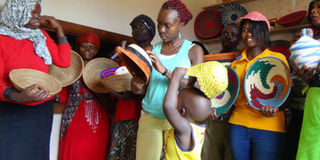Moving on after an acid attack

Lynette Kirungi, 26, is a graduate of Social Sciences from Makerere University. Recently, a stranger attacked her with acid as she returned home for a crime she does not know.
Her neck area was terribly burnt leaving her with scars and memories that for long will be part of her.
“Every time somebody calls me, memories of the attack pierce through mind,” she says, as she narrates how she has since moved on with life.
In Najjanankumbi, where I meet Kirungi, there are 45 other women survivors, who have found refuge at the Centre for Rehabilitation of Survivors of Acid and Burns Violence.
The centre was established in 2012 to address acid violence in Uganda as well as raise awareness against acid violence.
Here, people, some with injured eyes, struggle to weave, one of the key innovations that is giving survivors a lifeline.
They weave mats, crafts, table mats, caps, baskets, wallets and sweaters among others things. They also make liquid soap and jewellery.
The centre was established in 2011 by Hanifah Nakiryowa after her husband allegedly burnt her face with acid.
She is the heartbeat of the centre as she always conducts fundraising within Uganda and abroad to raise funds.
The centre is run by Justine Mpagi, who as the executive director, follows up on known victims.
“Many of the victims are brought here. We just train them and provide necessary material for them to push on with life,” she says.
Many of the products, according to Mpagi, are either sold locally or exported through orders that are placed by individuals or organisations.
The products range from Shs10,000 to Shs20,000 with monthly sales of about Shs700,000.
However, running the centre has not been without challenges due to lack if funds to implement certain programmes.
Beyond the funds is the challenge of accessing justice which almost has eluded most victims.
This, according to Kirungi is painful and has made them to advocate for a specific bill that will criminalise acid attackers.
“Government must urgently intervene and save people. There should be stringent measures to control access to acid,” she says.
The centre plans to set up a home and a well-structured institution to equip survivors in vocational skills.
It also plans, according to Mpagi, to set up a justice centre to assist victims access justice through recruiting lawyers to follow up on reported.
Most of the acid attacks, according to different surveys, result from disagreements in relationships and they are usually conducted by third parties.




